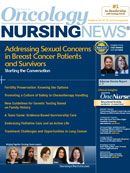Web-Based Program Helps Patients and Survivors to Manage Sexual Side Effects
Sexual problems, such as loss of desire, failure to get aroused easily, and vaginal dryness and pain during sexual activity, are prevalent among breast cancer survivors, and they rarely go away without treatment.
Leslie R. Schover, PhD
Sexual problems, such as loss of desire, failure to get aroused easily, and vaginal dryness and pain during sexual activity, are prevalent among breast cancer survivors, and they rarely go away without treatment. Nevertheless, barriers to meeting this unmet need persist, including a lack of communication on sexual issues between patients and their oncologists and nurses, a lack of cross-training in both sex therapy and psycho-oncology for mental health professionals, and poor insurance coverage for mental health services related to sexual dysfunction.
Leslie R. Schover, PhD, and researchers at the University of Texas MD Anderson Cancer Center in Houston, Texas, are testing the efficacy of a Web-based intervention: Tendrils: Sexual Renewal and Motherhood after Cancer as a way to help survivors address these issues.
“We need to get information directly to patients when they need it,” noted Schover in explaining the rationale for the project, adding that women sometimes don’t know where to go for help, and the website can assist in directing them to the right resources.
The interactive site offers information on a variety of topics, including:
- Basic anatomy
- How cancer treatments for a variety of cancers may impact sexuality
- Body image
- Sexual communication skills
- Relationship issues and dating after cancer
The website also offers information on cognitive- behavioral self-help to overcome problems related to loss of desire, vaginal dryness, pain, and trouble with orgasms, as well ways to resume sex comfortably.
A randomized efficacy trial of the intervention found that women who engaged with the website over 3 months, but supplemented by three in-person counseling sessions, derived greater benefit than those who used the website solely on a self-help basis over the same 12-week period. The group with counseling reported significant improvement on measures of sexual function, but there was no difference in emotional distress and quality of life when compared with the self-help only group.1
“It’s a very comprehensive website for all kinds of cancer,” said Schover, with sections for specific types of problems, such as low sexual desire, explaining why it might occur, and strategies patients can try on a self-help basis or find out what their medical options are. “It also has a lot of sections for partners,” Schover added. “We encourage patients to get their partner involved so they can work together on such issues as maintaining intimacy and dealing with body image concerns.” Schover anticipates that after additional research to determine how to effectively integrate the intervention into clinical practice and improve program uptake and adherence, the website will be available to the public later this year.
The project was funded by a small business grant from the National Cancer Institute.
References
- Schover LR, Yuan Y, Fellman BM, et al. Efficacy trial of an Internetbased intervention for cancer-related sexual dysfunction. J Natl Compr Canc Netw. 2013;11(11):1389-1397.

Nurse Practitioners Weigh in on Data From the San Antonio Breast Cancer Symposium
January 16th 2023Loyda Braithwaite, MSN, RN, AGPCNP-BC, AOCNP; and Jamie Carroll, APRN, CNP, MSN, highlight presentations from the 2022 San Antonio Breast Cancer Symposium that will influence oncology nursing practice.


